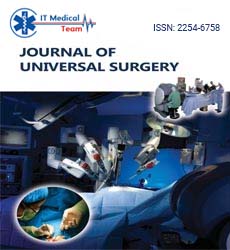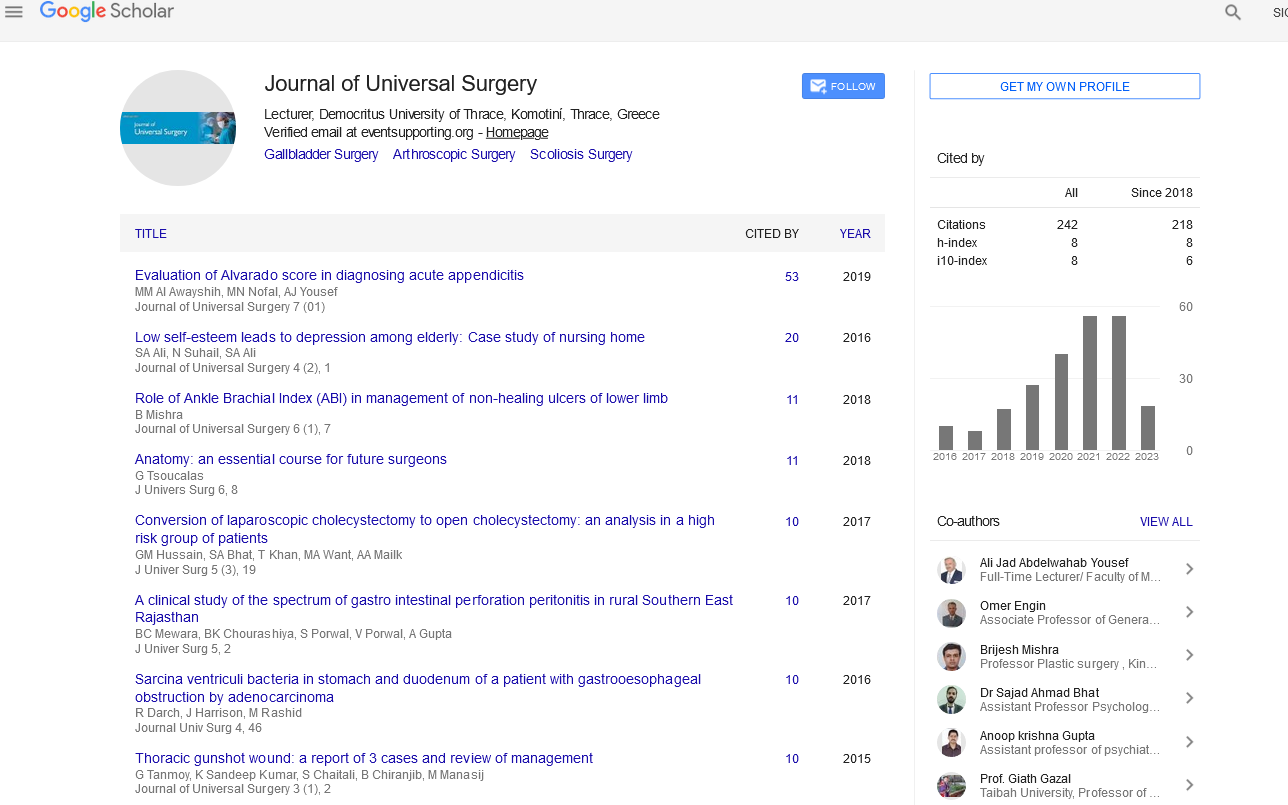Keywords
Mesenteric Meckel’s diverticulum; Meckel’s diverticulum; Diverticulitis; Peritonitis; Acute abdomen
Introduction
The mesenteric location of a Meckel’s diverticulum (MD) is a rare finding and has been described only thirteen times in the literature to date since 1941, with this case being the latest [1]. The traditionally recognised Meckel ’ s diverticulum often presents as a diagnostic dilemma pre-operatively and is not a routinely considered differential diagnosis, particularly with increasing age.
MD is prevalent in 2% of the general population and represents the most common congenital gastrointestinal tract abnormality. It is resultant of an incomplete obliteration of the vitelline duct between five to eight weeks gestation, leaving a true diverticulum of the small intestine with its own blood supply by the vitelline artery [2]. Known as the ‘rule of twos’, MD is usually two inches long, may contain two types of heterotopic tissue (gastric and pancreatic), and located within two feet proximal to the ileocaecal valve on the antimesenteric border.
Over recent decades one of the cardinal diagnostic features of MD, the antimesenteric location, has been challenged as cases of mesenteric origin have been seen. Here we demonstrate this rare triad of clinical, radiological and histological features not previously described.
Case Description
A 43-year-old usually well South-Asian male presented with one day of acute onset severe generalized abdominal pain, nausea and subjective fevers. Bowels had not opened for one day, however he was passing flatus. He was an ex-smoker and denied any history of previous similar episodes, abdominal surgery, per rectal bleeding, symptoms to suggest malignancy, or family history of inflammatory bowel disease or cancer. On examination, he was diaphoretic, mildly hypotensive with blood pressure of 108/69 mmHg, tachycardic at 115 beats per minute and febrile to 38.5°C (Figure 1).

Figure 1: Pre-operative axial CT image showing a centrally located 45 × 26 mm mesenteric collection containing air pockets with associated fat stranding (yellow arrow), and pneumoperitoneum suggestive of bowel perforation (red arrows).
His abdomen was moderately distended, guarded with generalised tenderness and peritonism. Biochemically, he had leukocytosis 11.5 × 109/L with neutrophilia, and a raised Creactive protein of 62.8 mg/L. Computed tomography (CT) imaging revealed a centrally located 45 × 26 mm mesenteric collection containing air pockets with associated fat stranding, and pneumoperitoneum suggestive of bowel perforation without a precise location of perforation accurately identifiable.
The visualised appendix was unremarkable. He proceeded to an emergency laparotomy. Intra-operatively, four-quadrant purulent and localised right iliac fossa faeculant contamination was encountered. A perforated 42 mm ileal diverticulum with a small mesodiverticulum arising on the mesenteric border approximately two feet proximal to the ileocaecal junction was found with surrounding abscess formation (Figures 2-4).

Figure 2: Intra-operative image of perforated mesenteric Meckel’s diverticulitis.

Figure 3: Intra-operative image of perforated mesenteric Meckel’s diverticulitis with mesodiverticulum at base.

Figure 4: Intra-operative image of mesenteric Meckel ’ s diverticulitis with perforation point and faeculant material visible (yellow arrow).
The diverticulum was dissected out and ligated from the mesentery then a wedge resection to its healthy base with primary closure perpendicular to the longitudinal axis of the bowel to prevent narrowing was performed.
Other intra-abdominal organs were inspected then thorough peritoneal lavage was completed. Histopathology confirmed small bowel diverticulitis perforation with presence of all wall layers, including a well-developed muscularis propria. There was absence of gastric or pancreatic heterotopia, and no evidence of dysplasia or malignancy. He received ongoing antibiotics and his recovery was complicated by a brief episode of ileus that resolved. He was discharged home on day seven post-operation and was seen in follow-up clinic with full recovery.
Discussion
The mesenteric origin of MD has been postulated to be due to the presence of a very short vitelline artery, thereby creating a mesodiverticular band pulling the diverticulum towards the mesenteric border during its rapid phase of growth [3]. A well-described case in an infant by Kurzbart et al saw an originally patent vitelline canal obliterate at three months of life leaving behind an MD situated on the mesenteric border, therefore supporting the possibility of this phenomenon [4]. As in our case, other literature have described features of the mesenteric diverticulum to be most consistent with MD, including the classic distance from the ileocaecal valve, a clear communication between the lumen of the bowel and diverticulum, and presence of all histological layers of small bowel wall [1,3,5-9]. These therefore distinguish it from other differential diagnoses such as ileal duplication cysts, non-Meckelian diverticula and carcinoid tumours. Hence in our view, such a clinical finding is most accurately described as a mesenteric Meckel’s diverticulum.
The clinical presentation of mesenteric MD is variable, ranging from asymptomatic incidental intra-operative diagnosis, to non-specific abdominal pain, per rectal bleeding, intussusception, diverticulitis, and perforation [1,6-9].
Conclusion
The findings of pneumoperitoneum on pre-operative CT and faeculant peritonitis intra-operatively in this case is the first and most severe presentation of mesenteric MD described in literature. It is imperative for a surgeon to recognise the existence of mesenteric MDs and therefore examine both borders during an exploratory operation to avoid missing the pathology. When encountered incidentally, surgical resection is recommended to avoid future potentially severe complications given its likelihood to involve the intimately neighbouring mesentery. Perhaps it is now time to redefine the diagnostic ‘rule of twos’ of MD to include ‘two possible locations: the anti-mesenteric and mesenteric borders’.
26656
References
- McGrath AK, Suliman F, Thin N, Rohatgi A (2019) Adult intussusception associated with mesenteric Meckel’s diverticulum and antimesenteric ileal polyp. BMJ Case Rep 12: e230612.
- Sarioglu-Buke A, Corduk N, Koltuksuz U, Karabul M, Savran B, et al. (2008) An uncommon variant of Meckel’s diverticulum. Can J Surg 51: E46-7.
- Kurzbart E, Zeitlin M, Feigenbaum D, Zaritzky A, Cohen Z, et al. (2002) Rare spontaneous regression of patent omphalomesenteric duct after birth. Arch Dis Child Fetal Neonatal Ed 86: F63.
- Abbas SH, Akbari K, Mason J, Booth M (2016) Mesenteric Meckel’s diverticulum: An unusual cause of small bowel intussusception. BMJ Case Rep 2016: bcr2016214830.
- Wani I, Khan N, Naqash S, Choudri N, Wani K (2013) Mesenteric Meckel’s diverticulum. Turk J Gastroenterol 24: 187-189.
- Yagnik VD, Dawka S (2019) Mesenteric Meckel’s diverticulum: An intra-abdominal surprise. ANZ J Surg 89: 1516-1518.
- Piotuch B, Lubikowski J, Szymanik K, Wójcicki M (2019) Mesenteric location of a perforated Meckel's diverticulum in an elderly patient with acute appendicitis: A case report. ANZ J Surg 89: E347-9.
- Levack MM, Fiedler AG, Kaafarani H, King DR (2018) Perforation of a mesenteric Meckel’s diverticulum. J Surg Case Rep 2018: RJY: 126.









